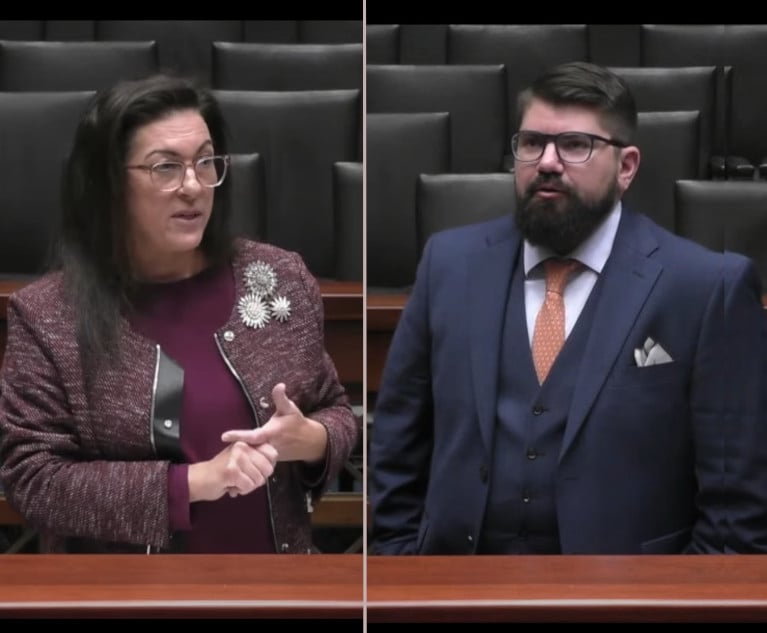The Bar Exam of the Future Offers Plenty to Be Excited About
The proposed uniform bar exam has a lot going for it, with plenty for current and prospective law students to be excited about.
December 28, 2018 at 11:46 AM
6 minute read

A new era is on the horizon for Texas law graduates taking the bar exam—but many current and prospective law students might not know anything about it.
The Texas Supreme Court has approved a recommendation to replace the Texas bar exam with the Uniform Bar Examination, effective in February 2021. It's a big deal, because reciprocity will allow graduates to transfer UBE scores to 34 other states. Another perk is the fewer topics and essay questions than the existing Texas bar exam.
“Most law students are so focused on the normal day-to-day of law school that they don't pay much attention to the bar exam. They just know the bar exam is hard and they'll have to take it one day,” said Femi Aborisade, president of the student bar association at The University of Texas School of Law in Austin.
Aborisade noted that he wished he had the choice to take the UBE rather than the Texas exam when he graduates in May.
“I'm a 3L and I think we have the notion it would be easier. We're a little disappointed it's not going to be implemented next year,” he said. “We were grandfathered into a bad system.”
It's a different story for current 1Ls, who will be sitting for the UBE in July 2021, and anyone graduating in December 2020, who would be taking the February 2021 exam.
They may have an easier time cramming than their predecessors and might even perform better, said James McGrath, associate dean of academic support, bar passage and compliance at Texas A&M University School of Law.
“I think it's a more manageable list of subjects to have to study post-graduation,” he said, explaining that the Uniform Bar Exam queries test-takers on 14 topics rather than 20, and has six essays rather than 12, as on the current Texas bar exam.
The current Texas bar exam already includes three of the UBE's four testing components—the multistate bar exam, multistate performance test and essay questions. However, the UBE doesn't test on Texas-specific procedure, evidence or essay subjects. To make up for the omission, the Supreme Court approved a recommendation to add a Texas law course and exam, which will ensure that law grads who want to be Texas lawyers have enough knowledge about Texas law, ethics and procedure. The Texas Board of Law Examiners will be working with the high court to create the Texas law course and exam.
Reciprocity is undoubtedly the test's biggest benefit.
“The UBE allows lawyers to move between states without spending the time and money needed to take multiple bar exams. This is advantageous for new law school graduates who wish to look for employment in more than one state—including both Texans who wish to move to other states, and those from other states who wish to practice law here,” said the May 2018 report by the Task Force on the Texas Bar Examination, the entity that recommended switching to the UBE. The Texas Supreme Court accepted the recommendation in October 2018.
Over the past eight years, use of the UBE has skyrocketed from nothing to 34 U.S. jurisdictions. Texas will be the 35th state. That means Texas law grads who take and pass the UBE starting in 2021 will be eligible to transfer their scores and become a licensed lawyer in: Alabama, Alaska, Arizona, Colorado, Connecticut, Idaho, Illinois, Iowa, Kansas, Maine, Maryland, Massachusetts, Minnesota, Missouri, Montana, Nebraska, New Hampshire, New Jersey, New Mexico, New York, North Carolina, North Dakota, Ohio, Oregon, Rhode Island, South Carolina, Tennessee, Utah, Vermont, Washington state, Washington, D.C., West Virginia, Wyoming and the U.S. Virgin Islands.
Having a state-specific law course to supplement the UBE is very common. The Texas task force recommendation was for an online Texas-specific exam—without essays—focused on Texas legal ethics, the Texas Constitution, civil and criminal procedure in our state and more.
Some other things are also left up to individual states. They still set their admission requirements, passing scores that range from 260 to 280, out of 400 total. The Texas task force recommended that the Supreme Court set Texas' UBE passing score at 270, because that's equivalent to the current Texas exam's passing score of 675. UBE states are also responsible for setting their own maximum age for transferred UBE scores, which typically range from two to five years, and states make their own character and fitness decisions and testing accommodation decisions.
According to the National Conference of Bar Examiners, a nonprofit that developed the UBE, it maximizes a law grad's job opportunities in other states. In addition to skipping the chore of taking multiple exams, if a grad failed to meet one state's minimum passing score, he could take the same score and get admitted to practice law in a state with a lower cut score.
Switching to the UBE is a great idea, said Nikki Smith, assistant dean of the office of career and professional development at Texas Southern University Thurgood Marshall School of Law in Houston.
“It gives people more flexibility, especially now we're in a state of people being more mobile and opportunities popping up around the country,” Smith said.
On the other side, the UBE might bring more job competition.
“We already have 10 Texas law schools. If we go with the UBE, we open opportunities for people outside the state of Texas,” she said.
Current 2L students who will graduate and take the July 2020 exam may have a hard choice to make—whether to sit for the last Texas bar exam, or attempt to take the UBE instead. This could happen if they wait for the first UBE in February 2021, or if parameters set up by the state would allow for it, perhaps go to another UBE state for the July 2020 exam and then transfer their scores to Texas.
“It's something we'll have to stay on top of and educate ourselves in the career office, so we can add that piece to our counseling,” Smith said.
Angela Morris is a freelance journalist. Follow her on Twitter at @AMorrisReports.
This content has been archived. It is available through our partners, LexisNexis® and Bloomberg Law.
To view this content, please continue to their sites.
Not a Lexis Subscriber?
Subscribe Now
Not a Bloomberg Law Subscriber?
Subscribe Now
NOT FOR REPRINT
© 2025 ALM Global, LLC, All Rights Reserved. Request academic re-use from www.copyright.com. All other uses, submit a request to [email protected]. For more information visit Asset & Logo Licensing.
You Might Like
View All
'It's Like They Lynched You:' Law Professor's Discrimination Claim Reaches High Court
7 minute read

Trending Stories
- 1Uber Files RICO Suit Against Plaintiff-Side Firms Alleging Fraudulent Injury Claims
- 2The Law Firm Disrupted: Scrutinizing the Elephant More Than the Mouse
- 3Inherent Diminished Value Damages Unavailable to 3rd-Party Claimants, Court Says
- 4Pa. Defense Firm Sued by Client Over Ex-Eagles Player's $43.5M Med Mal Win
- 5Losses Mount at Morris Manning, but Departing Ex-Chair Stays Bullish About His Old Firm's Future
Who Got The Work
J. Brugh Lower of Gibbons has entered an appearance for industrial equipment supplier Devco Corporation in a pending trademark infringement lawsuit. The suit, accusing the defendant of selling knock-off Graco products, was filed Dec. 18 in New Jersey District Court by Rivkin Radler on behalf of Graco Inc. and Graco Minnesota. The case, assigned to U.S. District Judge Zahid N. Quraishi, is 3:24-cv-11294, Graco Inc. et al v. Devco Corporation.
Who Got The Work
Rebecca Maller-Stein and Kent A. Yalowitz of Arnold & Porter Kaye Scholer have entered their appearances for Hanaco Venture Capital and its executives, Lior Prosor and David Frankel, in a pending securities lawsuit. The action, filed on Dec. 24 in New York Southern District Court by Zell, Aron & Co. on behalf of Goldeneye Advisors, accuses the defendants of negligently and fraudulently managing the plaintiff's $1 million investment. The case, assigned to U.S. District Judge Vernon S. Broderick, is 1:24-cv-09918, Goldeneye Advisors, LLC v. Hanaco Venture Capital, Ltd. et al.
Who Got The Work
Attorneys from A&O Shearman has stepped in as defense counsel for Toronto-Dominion Bank and other defendants in a pending securities class action. The suit, filed Dec. 11 in New York Southern District Court by Bleichmar Fonti & Auld, accuses the defendants of concealing the bank's 'pervasive' deficiencies in regards to its compliance with the Bank Secrecy Act and the quality of its anti-money laundering controls. The case, assigned to U.S. District Judge Arun Subramanian, is 1:24-cv-09445, Gonzalez v. The Toronto-Dominion Bank et al.
Who Got The Work
Crown Castle International, a Pennsylvania company providing shared communications infrastructure, has turned to Luke D. Wolf of Gordon Rees Scully Mansukhani to fend off a pending breach-of-contract lawsuit. The court action, filed Nov. 25 in Michigan Eastern District Court by Hooper Hathaway PC on behalf of The Town Residences LLC, accuses Crown Castle of failing to transfer approximately $30,000 in utility payments from T-Mobile in breach of a roof-top lease and assignment agreement. The case, assigned to U.S. District Judge Susan K. Declercq, is 2:24-cv-13131, The Town Residences LLC v. T-Mobile US, Inc. et al.
Who Got The Work
Wilfred P. Coronato and Daniel M. Schwartz of McCarter & English have stepped in as defense counsel to Electrolux Home Products Inc. in a pending product liability lawsuit. The court action, filed Nov. 26 in New York Eastern District Court by Poulos Lopiccolo PC and Nagel Rice LLP on behalf of David Stern, alleges that the defendant's refrigerators’ drawers and shelving repeatedly break and fall apart within months after purchase. The case, assigned to U.S. District Judge Joan M. Azrack, is 2:24-cv-08204, Stern v. Electrolux Home Products, Inc.
Featured Firms
Law Offices of Gary Martin Hays & Associates, P.C.
(470) 294-1674
Law Offices of Mark E. Salomone
(857) 444-6468
Smith & Hassler
(713) 739-1250







